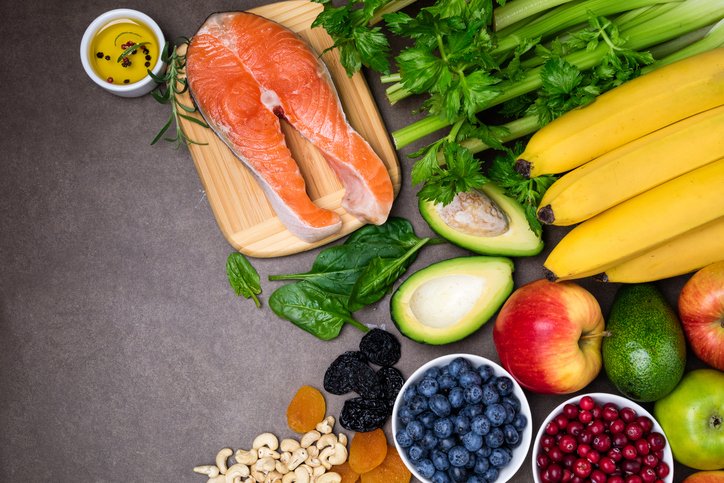This article looks at which foods you can eat, and which foods you should avoid, if you are thinking of using a ketogenic diet to fight your cancer.
A Ketogenic Diet is an extreme form of the Rainbow Diet (the colourful Mediterranean Diet). Just like the Rainbow Diet, it majors on no added or empty glucose products and lots of good fats, but it is much more limiting.
A Ketogenic Diet comprises
-
Only 2% of its calories from Carbohydrate
-
Only 8% of its calories from Protein
-
90% of its calories from Fats
The theory of the Ketogenic Diet
All cells like and use glucose. But if the glucose runs low in the blood stream, healthy cells are flexible and can simply switch to burning fats for fuel. This is called Ketosis, where the body converts fats into ‘Ketone bodies’ and these act as fuel.
Cancer cells have lost this flexibility, they cannot use ketone bodies - they NEED glucose to survive.
So, for example, if you have a brain tumour, your healthy brain cells need glucose but so do your brain cancer cells too. Put yourself into a state of ketosis and the healthy brain cells will feed on the ketone bodies, but the cancer cells can’t use ketone bodies and the cancer slowly withers away. That’s the theory. And brain cancer is often used as the example because glucose is so influential with that cancer.
Go to: A full explanation of the Ketogenic Diet
An alternative store of energy for brain cancer cells can be found in glutamate, produced in the body from the amino acid glutamine. Amino acids are the building blocks of protein. This is why a ketogenic diet restricts protein. Glutamine is not just a major metabolic fuel for brain cancer cells – it is a fuel for Tumour Associated Macrophages, TAM, which increase inflammation and blood vessel building in cancers. Glutamine thus makes cancers more aggressive.
It is important to make some observations clear at this point:
i) There is clear research evidence that cancers like brain cancer and colorectal cancer respond to sugar. There is less evidence that hormone driven cancers like breast or prostate cancer do. There is no serious evidence for blood and lymph cancers. So with most cancers, we are in the area of theory, with some animal studies.
ii) Indeed, you could argue that in other cancers, other factors are far more important. For example, prostate cancer is more likely to spread when ’LDL’ fat levels in the blood stream are high, when inflammation is high, and it is understood to be fueled by the glutamine-glutamate system.
iii) Tissue damage from chemotherapy and radiotherapy can increase oxidative free radicals and necrosis in an area of the body and this raises glutamate levels. Not surprisingly then, there has been research in 2017 on how both chemotherapy and radiotherapy can make matters worse in a person with cancer(1).
iv) There is research showing some drugs increase your blood sugar levels - for example the brain cancer drug Temozolomide; and the steroid Dexamethasone. Some drugs are known to increase your ’bad’ fat levels, for example, Zolodex.
v) Heightened levels of ’bad’ LDL fat is known to increase the risk of metastases in many cancers, reducing survival times(2).
If you are going to use a Ketogenic Diet it is important to consider which cancer you have above all else; then to heighten your fat levels predominantly with ’good’ fats like Extra Virgin Olive Oil, avocados, fish oils and nut and seed oils first. LDL can be reduced by supplements such as Lycopene, which can even heighten levels of HDL in the blood stream(3).
There are a number of studies where people use the diabetes drug, metformin, to reduce blood sugar levels. Others use the herb Berberine (4).

Is the Ketogenic Diet safe?
The Ketogenic Diet has been used for several decades in the treatment of brain seizures and ’fits’ in children. Research has now been conducted on its use for seizures in adults. No side-effects have been reported.
*** Ketogenic Diet Foods – what to eat; what to avoid
(i) Foods to include in a Ketogenic Diet
1. Carbohydrates (2% total calories)
a. Non-starchy vegetables – like cruciferous vegetables (kale, broccoli, Brussels sprouts, cabbage, cauliflower), spinach, lettuce, chives, bok choi, leeks
b. Radish, asparagus, artichoke, fennel, chicory, celery
c. Spring onions, onions, red and yellow peppers
d. Aubergines, courgettes
e. Berries (one of the fruits not too high in carbs
f. Herbs, cinnamon, berberine
g. Olives
h. Herb teas, water, coffee
i. (medicinal) mushrooms
j. Fruits such as tomatoes, avocado
2. Protein (8% total calories)
a. Fish, shell fish
b. Organic meats and poultry – especially grass fed
c. Eggs
d. Offal
3. Oil/Fat (90% of total calories)
a. Olive oil, walnut oil
b. Dark chocolate and cocoa
c. Fish oil/krill oil supplement
d. Full fat, organic, unpasteurized dairy, cheese, butter, cream (goat’s, cows’, sheep); ghee
e. Coconut oil
f. Nuts and seeds (lowest carbs in walnuts, almonds, pecans, Macadamia, Brazil, flaxseed, sunflower, sesame, pumpkin seeds, psyllium husk)

(ii) Foods to avoid in the Ketogenic Diet
1. Carbohydrates (2% total calories)
a. Starchy vegetables – potatoes, carrots, beetroot, parsnip, pulses
b. Refined, preserved or processed foods
c. All grains – even whole meal (wheat, rye, corn, oats, millet, rice).
d. Pizza, bread, biscuits, cake
e. Bought fruit juice
f. Refined honey, sugar
g. Fizzy soft drinks
h. Puddings
i. Ice cream
j. Sweet fruits – peach, apricot, dragon fruit, pineapple, grapefruit, oranges, plums, cherries, apples, pears, mango, banana
k. Sweeteners, especially in ‘diet’ products
l. Peanuts
m. Dried fruits
n. GMO foods
2. Proteins (8% total calories)
a. Bone broth
b. Factory farmed meats and fish
c. Glutamine supplements
d. Whey Protein
e. Cured, smoked, processed meats and fish products, sausages, bacon
3. Fats (90% total calories)
a. Mass market milk
b. Refined fats and oils
c. Soy, almond drinks
Be Sensible!
This is meant to be an introduction to the realities of the Ketogenic Diet. There are lots of websites on the Internet extolling its virtues. Many offer suggestions that conflict with others. Many offer suggestions which are really not sensible if you have cancer.
You must not play with diets if you have cancer. And, to repeat, the research to date on the Ketogenic Diet has largely been confined to animals, and to brain cancer. The rest is theory.
Always read the overview on your cancer on this website before you even think of starting a Ketogenic Diet.
You may find the Rainbow Diet – which has a huge amount of research to support it, with all manner of illnesses from cancer to diabetes, heart disease and dementia – easier to live with and just as beneficial for the majority of cancers.
Several studies show the Rainbow Diet prevents cancer and other chronic illnesses, and increases survival times.
Go to: The colourful Mediterranean Diet
References
1. Metabolic management of cancer
2. Saturated fat and increased cancer risk
3. Lycopene cuts LDL levels
4. Berberine as a cancer treatment